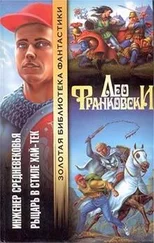Лео Франковски - The High-Tech Knight
Здесь есть возможность читать онлайн «Лео Франковски - The High-Tech Knight» весь текст электронной книги совершенно бесплатно (целиком полную версию без сокращений). В некоторых случаях можно слушать аудио, скачать через торрент в формате fb2 и присутствует краткое содержание. ISBN: , Жанр: Альтернативная история, на английском языке. Описание произведения, (предисловие) а так же отзывы посетителей доступны на портале библиотеки ЛибКат.
- Название:The High-Tech Knight
- Автор:
- Жанр:
- Год:неизвестен
- ISBN:0-345-32763-2
- Рейтинг книги:4 / 5. Голосов: 1
-
Избранное:Добавить в избранное
- Отзывы:
-
Ваша оценка:
- 80
- 1
- 2
- 3
- 4
- 5
The High-Tech Knight: краткое содержание, описание и аннотация
Предлагаем к чтению аннотацию, описание, краткое содержание или предисловие (зависит от того, что написал сам автор книги «The High-Tech Knight»). Если вы не нашли необходимую информацию о книге — напишите в комментариях, мы постараемся отыскать её.
The High-Tech Knight — читать онлайн бесплатно полную книгу (весь текст) целиком
Ниже представлен текст книги, разбитый по страницам. Система сохранения места последней прочитанной страницы, позволяет с удобством читать онлайн бесплатно книгу «The High-Tech Knight», без необходимости каждый раз заново искать на чём Вы остановились. Поставьте закладку, и сможете в любой момент перейти на страницу, на которой закончили чтение.
Интервал:
Закладка:
When I use the word "socialism," I mean a political system in which the social rights are held to be more important than, say, property rights or rights of inheritance. I mean a system in which every person is born with the same basic rights.
The right to live comes first, and included in that is the right to the minimal food, clothing, and shelter ' without which life is impossible. I don't mean luxury, but I do mean enough to keep body and soul together.
I mean the right to an education, paid for by the community, to the extent of the individual's ability.
I mean the right to start out even with everybody else. I think that inherited wealth is a bad idea and is harmful to both the individual and to society.
I believe that democracy is the best possible system for a nation with an educated, concerned, and reasonable population.
It is not that the people are particularly wise. They aren't. And the larger the number of people involved in a decision, the poorer the decision is likely to be. To find the IQ of a group, take the average IQ of the people involved and divide by the number-of people in the group. Anyone who has ever marched troops can verify that a hundred men have the collective intelligence of a centipede. Worse. A centipede doesn't step on its own feet.
No. Democracy is a good system because it is an extremely stable system.
In many parts of South America and Africa, when an individual becomes truly disgruntled, he gets together with six hundred friends, three hundred rifles, and maybe a hundred bullets and starts a revolution. This practice is socially disruptive and results in lost worktime, destroyed property, and dead bodies.
In America, such an individual does not go off to the hills with a gun. He becomes a political candidate. Of course, he knows that, to be effective, he must start at the bottom-say, sewer commissioner.
So he runs against six other social misfits for that office.
If he loses, at least he feels that he has done his best to straighten things out, that if the people don't appreciate him, they don't deserve him. Anyway, an election is so exhausting, physically, financially, and emotionally, that he is likely to be over his initial anger.
If he wins, well, he can't really do much harm. There are engineers to make sure that shit flows downhill. And who knows? Maybe he will turn out to be a good sewer commissioner.
In any case, society is the winner. Seven potential troublemakers have been defused, only one of them has to be paid, and they just might get some useful work out of that one.
The eastern bloc nations do not enjoy this social advantage. A single political party approves all candidates for office, assuring their loyalty, but also screening out the obvious mental defectives, at least on the lower levels. In so doing, they increase the amount of social frustration, which causes a lack of the very stability that the approval process was designed to ensure. Still, it's a better system than having the sons of kings warring to see who will be the next king.
Democracy doesn't work well unless the proper level of education and the proper institutions both exist. Those things won't happen in thirteenth century Poland for at least one generation and possibly three, no matter what I do.
Capitalism, as practiced in the twentieth century, has some definite advantages. For one thing, companies are allowed to fail and so cease to exist. The physical assets are redistributed, the workers find new jobs, and the poor management which generally caused the problem is put out to pasture.
In a centrally-controlled economy, it is extremely embarrassing or politically impossible for such powers that be to eliminate inefficient managers.
In large organizations, it is hard to be noticed, so it is very difficult to do something that is demonstratively right. It therefore becomes critically important to your career that you never do anything that is demonstratively wrong. Fools may not be fired, but they are rarely promoted, either. To downgrade a subordinate manager seems to imply that one didn't know what one was doing when one promoted him in the first place. Best to leave him alone and hope that nobody notices. It takes something fairly obvious, an exploding atomic power plant for example, to get anything changed. But generally, things just go on as usual.
This results in the same fools making the same mistakes forever. People become demoralized, especially the best, most energetic workers. Useful work slows or even comes to a halt. I don't mean that the workers stop working. They are all furiously active, looking busy. They worry all day long and go home tired. But they are not doing anything useful.
Nor is this problem limited to the centrally controlled economies of eastern Europe. In major American corporations, poor managers are sometimes given "lateral promotions," perhaps to "company historian," but they are rarely removed.
Another advantage to capitalism is that small companies can do astounding things without the matter becoming political. And I mean both astoundingly good and astoundingly stupid. If enough people try enough new things and if there is some mechanism for dumb ideas to be eliminated, better processes will develop and society will benefit.
People will shake their heads or laugh at someone doing something silly with his own money, but they won't try to vote their congressman out of office because of it. But if it is the goverment's money being spent, they rightly think it's their money being wasted and the matter becomes political. Consider the way one blown gasket stopped the entire American space program for years.
Progress is impossible without trying new things. New things often don't work. Since large organizations do not permit failure, virtually all progress results from the work of small private companies.
Yet capitalism has a number of serious problems that seem to be intrinsic to it. Private companies are generally founded by productive people, often engineers. But when the founder retires, somehow the accountants always seem to take over, and a button-counter is rarely a good decision-maker. Or, the founder's widow or son-in-law tries to run the company and things are worse.
Such foolishness would be unthinkable in eastern Europe. There, managers are almost always trained engineers. Many are not brilliant but most are competent.
Oh, the worst faults of capitalism, the ones Marx was concerned with, have been patched over with governmental institutions and regulations, at least in America. Monopolies are forbidden or regulated. Surplus workers are not allowed to starve. Vast profits are largely taxed away, although there is still a huge class of people who,do nothing productive but are very wealthy.
Yet this very patchwork has problems of its own. In Poland, if your teeth are bad, you go to a dentist and he fixes them. No matter who you are, even if you are not a citizen, if you are human, you have a fight to good teeth. Paperwork is minimal. In America, some people have this right and some don't. Most people don't, so they have a vast number of office workers filling out forms that try to prove that only those with special rights get these special privileges.
I am convinced that it should be possible to design an economic and political system that has the advantages of both capitalism and socialism with the problems of neither. If I can figure it out, thirteenth century Poland is going to be a fine place to live.
By the time Krystyana and the others returned from the hunt, I was feeling much better, having thought a lot of things out of my system. We dressed for another boring supper.
I simply didn't have much in common with the nobles of Wawel Hill. There wasn't much of anything I could say to them and I was eager to get on with our errand and return to Three Walls.
Читать дальшеИнтервал:
Закладка:
Похожие книги на «The High-Tech Knight»
Представляем Вашему вниманию похожие книги на «The High-Tech Knight» списком для выбора. Мы отобрали схожую по названию и смыслу литературу в надежде предоставить читателям больше вариантов отыскать новые, интересные, ещё непрочитанные произведения.
Обсуждение, отзывы о книге «The High-Tech Knight» и просто собственные мнения читателей. Оставьте ваши комментарии, напишите, что Вы думаете о произведении, его смысле или главных героях. Укажите что конкретно понравилось, а что нет, и почему Вы так считаете.










